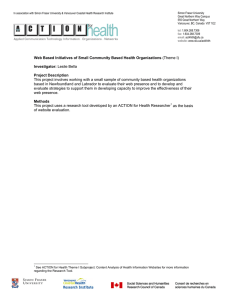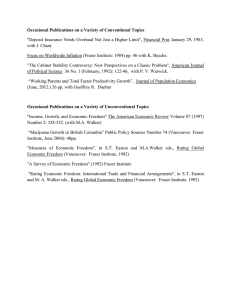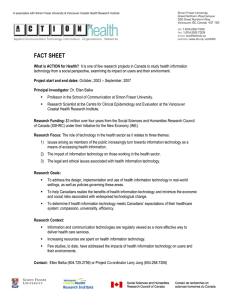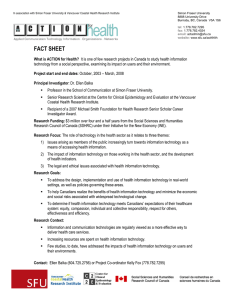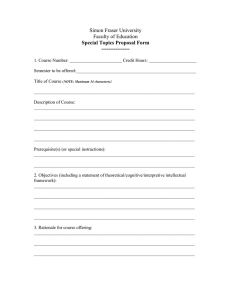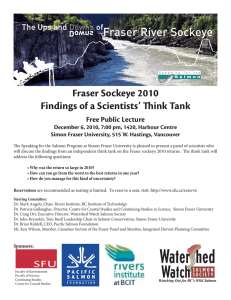L Non-Profit Studies
advertisement
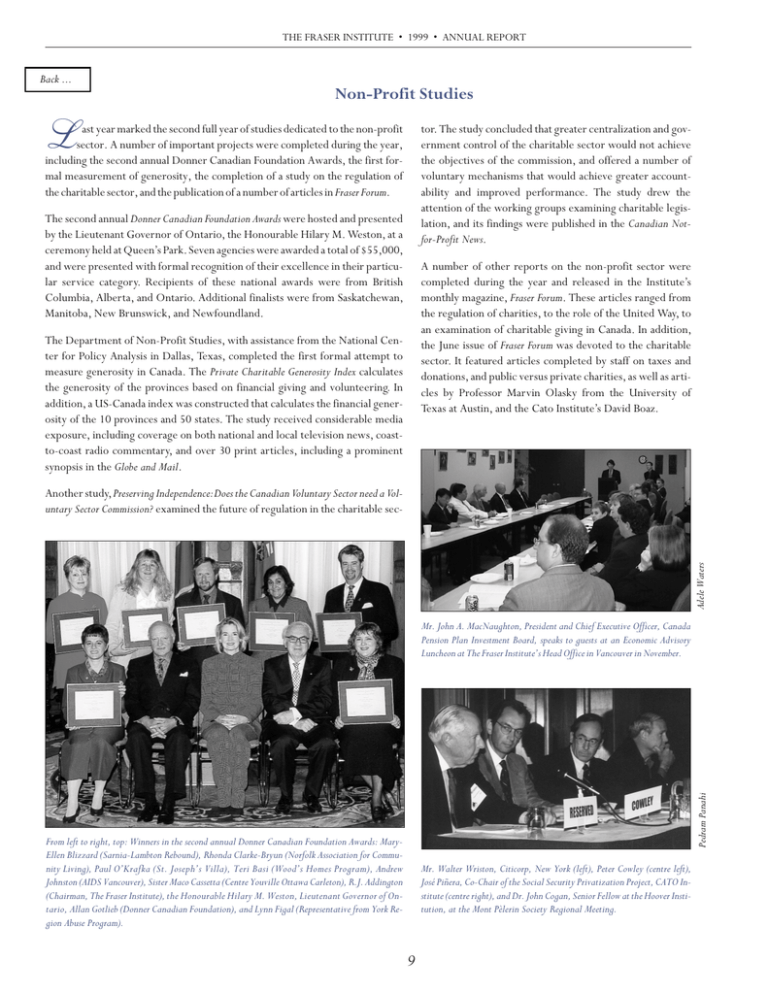
THE FRASER INSTITUTE • 1999 • ANNUAL REPORT Back ... Non-Profit Studies L ast year marked the second full year of studies dedicated to the non-profit sector. A number of important projects were completed during the year, including the second annual Donner Canadian Foundation Awards, the first formal measurement of generosity, the completion of a study on the regulation of the charitable sector, and the publication of a number of articles in Fraser Forum. tor. The study concluded that greater centralization and government control of the charitable sector would not achieve the objectives of the commission, and offered a number of voluntary mechanisms that would achieve greater accountability and improved performance. The study drew the attention of the working groups examining charitable legislation, and its findings were published in the Canadian Notfor-Profit News. The second annual Donner Canadian Foundation Awards were hosted and presented by the Lieutenant Governor of Ontario, the Honourable Hilary M. Weston, at a ceremony held at Queen’s Park. Seven agencies were awarded a total of $55,000, and were presented with formal recognition of their excellence in their particular service category. Recipients of these national awards were from British Columbia, Alberta, and Ontario. Additional finalists were from Saskatchewan, Manitoba, New Brunswick, and Newfoundland. A number of other reports on the non-profit sector were completed during the year and released in the Institute’s monthly magazine, Fraser Forum. These articles ranged from the regulation of charities, to the role of the United Way, to an examination of charitable giving in Canada. In addition, the June issue of Fraser Forum was devoted to the charitable sector. It featured articles completed by staff on taxes and donations, and public versus private charities, as well as articles by Professor Marvin Olasky from the University of Texas at Austin, and the Cato Institute’s David Boaz. The Department of Non-Profit Studies, with assistance from the National Center for Policy Analysis in Dallas, Texas, completed the first formal attempt to measure generosity in Canada. The Private Charitable Generosity Index calculates the generosity of the provinces based on financial giving and volunteering. In addition, a US-Canada index was constructed that calculates the financial generosity of the 10 provinces and 50 states. The study received considerable media exposure, including coverage on both national and local television news, coastto-coast radio commentary, and over 30 print articles, including a prominent synopsis in the Globe and Mail. Adele Waters Another study, Preserving Independence:Does the Canadian Voluntary Sector need a Voluntary Sector Commission? examined the future of regulation in the charitable sec- Pedram Panahi Mr. John A. MacNaughton, President and Chief Executive Officer, Canada Pension Plan Investment Board, speaks to guests at an Economic Advisory Luncheon at The Fraser Institute’s Head Office in Vancouver in November. From left to right, top: Winners in the second annual Donner Canadian Foundation Awards: MaryEllen Blizzard (Sarnia-Lambton Rebound), Rhonda Clarke-Bryun (Norfolk Association for Community Living), Paul O’Krafka (St. Joseph’s Villa), Teri Basi (Wood’s Homes Program), Andrew Johnston (AIDS Vancouver), Sister Maco Cassetta (Centre Youville Ottawa Carleton), R.J. Addington (Chairman, The Fraser Institute), the Honourable Hilary M. Weston, Lieutenant Governor of Ontario, Allan Gotlieb (Donner Canadian Foundation), and Lynn Figal (Representative from York Region Abuse Program). Mr. Walter Wriston, Citicorp, New York (left), Peter Cowley (centre left), José Piñera, Co-Chair of the Social Security Privatization Project, CATO Institute (centre right), and Dr. John Cogan, Senior Fellow at the Hoover Institution, at the Mont Pèlerin Society Regional Meeting. 9 THE FRASER INSTITUTE • 1999 • ANNUAL REPORT Environmental Studies I n 1999, The Fraser Institute’s environmental studies program expanded its focus to include the topics of risk and regulation. The Ottawa conference, Junk Science… Junk Policy? Managing Risk and Regulation marked the first foray into this new territory. At the conference, experts examined case studies in risk management and discussed a risk and regulatory reform agenda for Canada. The papers from this conference will be published in a book early in the year 2000. the United Kingdom and Mexico. The fourth edition of this report, which was completed in the summer of 1999 with the help of a student intern, will be published in April of the year 2000. With the assistance of another student intern, the Institute continued investigating market solutions to environmental problems. The results of this research, which compares the effectiveness of tradable emissions permits with that of command-and-control regulations for improving air quality, will be published in 2000. Pedram Panahi The third edition of the Environmental Indicators Critical Issues Bulletin was published in April to help focus Earth Day (April 22) debates on trends in environmental quality. The study examines air quality, water quality, natural resource use, land use, and solid waste disposal. Contrary to popular public opinion, the indicators study shows that in many of these areas, environmental quality has improved significantly over the past 20 years. The third edition contained information on The Fraser Institute also published the Canadian edition of the book Facts,Not Fear in 1999. The book reviews what children in primary and secondary school learn about the environment from their textbooks, teachers, and outside reading. It counters some of the irresponsible claims of environmental extremists and provides a more balanced view of popular environmental controversies. Another environmental education study focusing on what university students think about environmental topics is under way and scheduled for publication in 2000. Dr. Byeong-Ho Gong, President of the Center for Free Enterprise, South Korea (left), Laura Jones, Director of Environment and Regulatory Studies at The Fraser Institute, and Mr. Thomas Henriksen, Associate Director and Fellow of the Hoover Institution, Stanford University, gather after a session at the Mont Pèlerin Society Regional Meeting. Following the successful 1998 conference on protecting endangered species, the Institute published the Critical Issues Bulletin Crying Wolf? Public Policy on Endangered Species in Canada. The report, which received national media coverage, concludes federal legislation is not the most effective way to protect Canada’s endangered species. The problems facing the mining industry were once again highlighted in The Fraser Institute Annual Survey of Mining Companies. The survey asks companies to reveal how policy factors such as taxation, regulation, and uncertainty concerning land use affect their investment. Three speakers at The Fraser Institute conference “Junk Science, Junk Policy? Managing Risk and Regulation” in Ottawa on April 29. From left, Professor Tammy Tengs, School of Social Ecology, University of California at Irvine, Mr. Terence Corcoran, Editor, The Financial Post, and Professor Peter Neumann, Center for Risk Analysis, Harvard University, Boston. 10 THE FRASER INSTITUTE • 1999 • ANNUAL REPORT Canadian Governance The Canada Project and the Aboriginal Project are both the work of Gordon Gibson, Senior Fellow in Canadian Studies at The Fraser Institute. The Canada Project, commenced in 1994 with the book Plan B: The Future of the Rest of Canada, researches ways of improving Canadian unity and federalism. Its thrust is towards applying the concept of subsidiarity to the federation, implying a generally more decentralized and privatized system of governance. To this end, Mr. Gibson held meetings during the year with the past and present chairs of the Annual Premiers’ Conference (Saskatchewan Premier Romanow and Quebec Premier Bouchard) as well as politicians and officials at the federal, provincial, and municipal levels. In addition to numerous articles, Mr. Gibson was an invited speaker at the 50th Anniversary celebrations of Newfoundland joining Confederation; a major parliamentary reform conference in Edmonton sponsored by the Rt. Hon. Joe Clark and Ian McLelland, MP; and the Annual Meeting of the Canadian Study of Parliament Group in Ottawa. In general,1999 was a year of cross-currents,with declining interest in sovereignty in Quebec, an associated and unfortunate declining interest in reform of the federation in Ottawa, and a continued preoccupation of provincial governments with local matters, to the detriment of improved intergovernmental relations. During 1999, the Aboriginal Project focused on the Nisga’a Treaty. Mr. Gibson wrote two major papers on the topic and arranged for a third by an outside consultant, Stuart Adams. The work also included articles published in Fraser Forum, in the newsletter of the Council for Canadian Unity, and in various columns on the topic. Lorena Baran Mr. Gibson participated in The Fraser Institute Delgamuukw conference in Ottawa, addressed the Municipal Finance Authority on aboriginal matters, and maintained contact with federal, provincial, and native officials, and treaty negotiators. Satsan (Herb George), Hereditary Wet’suwet’en Chief and BC Regional Vice Chief, Assembly of First Nations (left), answers a question from the audience at the conference “The Delgamuukw Case: Aboriginal Land Claims and Canada’s Regions,” moderated by Dr. Owen Lippert, Director of The Fraser Institute’s Law and Markets Project. 11 Nineteen-ninety-nine saw the major treaty negotiations in BC reach an impasse. The year also saw substantial completion of Mr. Gibson’s Principles for Treaty Making (published in 2000) which builds on the fundamental principle that while special and important Indian property rights undoubtedly exist, the political and citizenship rights of all Canadians should be the same. Failure to adhere to that principle for the past 130 years is the proximate cause of the tensions and unhappiness of today. Governance Towards the end of 1999, The Fraser Institute decided to create a new department focused on governance. The Governance and Civil Society department will be part of the projects researched and initiated in the Institute’s Alberta office. The unit will examine the long-term changes in Canada’s governance structure. Topics to be examined will include the effects of globalization; the problems of federalism; economic diversification; demographic shifts; public-private sector relations involving all three orders of government, including aboriginal affairs; and Canada-United States cooperation. The main focus will be how the three orders of government in Canada are coping with a turbulent global environment. The Governance and Civil Society department will examine more than just the structure of government; it will also look at how government affects private matters. Some of the research will expand and complement Gordon Gibson’s excellent work. Notable scholars from the University of Calgary such as Barry Cooper, Tom Flanagan, Rainer Knopff, Ted Morton, Ken MacKenzie, Ron Kneebone, and David Bercuson will conduct the research. Lydia Miljan, who currently runs the National Media Archive out of Calgary, will be the administrative head of the department. Kristin McCahon Canada and Aboriginal Projects Following his Economic Advisory presentation “Social Union and Political Disunion,” Bloc Quebecois MP and Foreign Affairs Critic Daniel Turp (left) takes questions from the audience as Gordon Gibson, the Institute’s Senior Fellow in Canadian Studies, looks on. THE FRASER INSTITUTE • 1999 • ANNUAL REPORT The Social Affairs Centre T he Social Affairs Centre recognizes that, increasingly, the problem areas of government are those associated with social policy. The problems, for example, of a failing education system and a growing dependency culture are acknowledged but unsuccessfully addressed by government. Therefore, the central question investigated by the Centre is whether or not government control of social policy is a better, more efficient, or fairer basis for meeting popular aspirations than the competitive market model. ground-breaking conference successfully publicized the economic, health, legal, and philosophical arguments surrounding the issue of tobacco regulation. The papers presented at this conference are to be published in serial form in the spring of 2000. This conference followed the April publication of a highly successful book on the issue of environmental tobacco smoke. Co-authored by Drs. Gio Gori and John Luik, Passive Smoke: The EPA’s Betrayal of Science and Policy, debunked the major scientific myths surrounding second-hand smoke. In August, Prof. David Finley authored a case study of a recent Simon Fraser University sexual harassment investigation. The report served as a cautionary tale for many universities, organizations, and societies who imagine that their own arrangements are satisfactory. As The Trial of Liam Donnelly:Conviction by Prejudice demonstrates, the issues reach far beyond the administrative foibles of one university. During 1999,attention was primarily devoted to the issues of education and social regulation. Such was the institutional and grassroots influence of the inaugural Secondary Schools Report Card for British Columbia publication that the research data was refined,updated,and expanded in order to produce, in March 1999, a second British Columbia report card and an inaugural Secondary Schools Report Card for Alberta. In May, The Centre published Boys,Girls and Grades:Is There Gender Inequality in BC’s Schools?—an empirical assessment of the relative success of female students in provincial high schools. The study found that, in British Columbia, gender-based differences in school performance are systematic, extensive, and persistent. During the second half of the year, extensive research was undertaken on a study assessing the costs and benefits of legalized gambling. The report, entitled Gambling With Our Future?, will be published in early 2000. A paper examining the international ideological phenomenon known as the “Third Way” was written in late 1999 and was published as The Third Way:Marketing Mirage or Trojan Horse? in January 2000. Building upon these and other research projects, during 2000 the Centre will endeavour to provide a vigorous critique of problematic current and proposed social policies, while attempting to educate Canadians of the merits of a shift toward private, individual, and family-based solutions to social problems. Toronto-based Education Policy Analyst Claudia Rebanks Hepburn’s comprehensive report entitled The Case for School Choice was published in September. Her study assessed the relevance to Canada of education policy reforms enacted in New Zealand, Sweden, Denmark, and the United States. Pedram Panahi These publications, co-authored by education policy researcher Peter Cowley and Senior Fellow Prof. Steve Easton, further stimulated a public debate over the respective merits of the measurement of school performance. Pedram Panahi Lorena Baran (all) In May, the Centre organized a conference on the pros and cons of tobacco regulation, held in Ottawa. Featuring an array of leading academic, scientific, and legal experts, this John O’Sullivan, Editor-atLarge, National Review, responds to an audience question at the Mont Pèlerin Society Regional Meeting. Panel members include Fraser Institute Education Policy Researcher Peter Cowley (centre left), Richard Rahn, Chairman, Novecon Financial Ltd (centre right), and Dr. Andrei Illarionov, Director, Institute of Economic Analysis, Russia (recently appointed as Economic Advisor to Russian Prime Minister Vladimir Putin). Nobel Laureate Milton Friedman (centre) makes a point during a panel discussion at the Mont Pèlerin Society Regional Meeting. He is flanked by Wall Street Journal Editor and Vice President, Robert Bartley (left) and Dr. Stephen Easton, Fraser Institute Visting Scholar. Lorne Gunter, columnist with the Edmonton Journal (left), Robert Levy, Senior Fellow in Constitutional Studies at the Cato Institute in Washington, DC (centre), and the Globe and Mail’s Rick Salutin share their views in The Fraser Institute conference, “Should the Government Butt Out? The Pros and Cons of Tobacco Regulation,” held in Ottawa on May 13. 12 THE FRASER INSTITUTE • 1999 • ANNUAL REPORT Health Policy Research N ineteen-ninety-nine was a year of great prominence for health policy issues and for the Institute as a commentator on those issues. Central to the Institute’s role in the debate were its three major publications in health policy, which addressed the topics of alternative medicine use, medical technology availability, and waiting times for medical treatment. Alternative Medicine in Canada: Use and Public Attitudes, written by former Institute health economist Cynthia Ramsay, executive director Michael Walker, and former Institute researcher Jared Alexander, reported the Institute’s survey of Canadians’ experiences with, and views of, alternative therapies and treatments. The study found that 50 percent of the Canadian public use alternative therapies over the course of a year, while 73 percent do so over their lifetimes. the highly-publicized Ontario Medical Association May summit on reform of the Canada Health Act, and delivered a major address at a November conference in Vancouver on the regulation of alternative medicine, as well as serving as a regular commentator on health issues on radio, television, and in print. The Institute’s work on health policy in 2000 will build on this growing foundation, with analysis of government health spending, the consequences of waiting times, and a blueprint for health care reform. In Waiting Your Turn:Hospital Waiting Lists in Canada (9th edition), Fraser Institute executive director Michael Walker and director of health policy research Martin Zelder describe the lengthy waiting times for many important medical treatments. This report reveals that 8 of the 10 provinces experienced longer average waiting times than they had in the previous year, and that for certain treatments, such as elective cardiovascular surgery and orthopaedic surgery, waiting times exceeded 5 months. Courtesy of the Ontario Medical Association The Availability of Medical Technology in Canada: An International Comparative Study, written by Institute senior fellow William McArthur, Institute director of health policy research Martin Zelder, and former Institute researchers David Harriman and Jared Alexander, addressed the relatively limited availability of many basic and advanced forms of medical technology in Canada. In particular, the study found that although Canada is in the top sixth of OECD countries in terms of health spending, it ranks in the bottom third among that same group in terms of per person availability of technology, such as MRIs and CT scanners. In Toronto, Dr. Martin Zelder, Director of Health Policy Research (right), prepares to make his presentation in May at the Ontario Medical Association summit on the Canada Health Act . Vanessa Schneider Above: Dr. Francisco Gil Diaz, Former Deputy Governor, Bank of Mexico (left), Fraser Institute Education Policy Researcher Peter Cowley (centre) and Professor Arnold Harberger, Department of Economics, UCLA, on a panel discussion at the Mont Pèlerin Society Regional Meeting. Below: Former Prime Minister of the Czech Republic, Dr. Vaclav Klaus (left) greets Mr. Ed Feulner, Jr., President of the Heritage Foundation, at the Mont Pèlerin Society Regional Meeting. In Vancouver, Fraser Institute Director of Health Policy Dr. Martin Zelder leads a discussion with a break-out group of students at The Fraser Institute’s Student Seminar on Public Policy Issues for high school students in October. 13 Pedram Panahi (both) The findings in each of these reports were prominently and extensively reported, appearing throughout Canada on television and radio and in major national newspapers, including the Globe and Mail and the National Post. Enhancing the Institute’s profile on these issues, Zelder appeared as an invited speaker at THE FRASER INSTITUTE • 1999 • ANNUAL REPORT Pharmaceutical Policy Research Centre Research Activities The Fraser Institute established parameters for making useful comparisons between drug prices in the US and Canada. This work continues into 2000. The Pharmaceutical Policy Research Centre’s (PPRC) major research thrust has been the development of a protocol for a detailed evaluation of reference based pricing as it is practised in British Columbia. Two protocols have been completed: one examines the patient outcomes with 800 patients with one disease at one site; the second, more extensive proposal will examine 3,200 patients with two diseases at two sites. With this work completed the project is now ready to move ahead to the data collection phase and numerous variations on the original protocols are possible. These protocols have been peer reviewed by outside scientists and found to be satisfactory. One research topic started by Dr. McArthur in 1998 was completed and published. This was the examination of modern medical technology in Canada compared with other countries. The results painted a bleak picture; this research has proved useful to medical practitioners in their battle to bring Canada back to acceptable world standards in this area. Education In May 1999, Dr. McArthur in collaboration with Dr. Owen Lippert, Director of The Fraser Institute’s Law and Markets Project, and others gave presentations in Santiago, Chile, and Buenos Aires, Argentina, on the topic of intellectual property rights and the pharmaceutical industry. These papers were published and distributed at the conferences and later in the year were published in The Fraser Institute book Competitive Strategies for the Protection of Intellectual Property. The difference in the costs of pharmaceuticals among different countries is also under study. The reason for the differing costs is complex; other scientists studying this topic have found it almost impossible to achieve accurate, direct comparisons between drugs. Nevertheless, by the end of 1999, Dr. McArthur spoke on pharmaceutical policy and intellectual property rights related to the industry on national and local radio and television programs across Canada. He also gave presentations on this topic to groups such as the Canadian Association of Health Executives, the BC Chamber of Commerce, and the America’s Business Forum in Toronto. Collaboration Pedram Panahi The PPRC maintained contact with many other external researchers during the year, including Professor Susan Horn at the University of Texas, Houston; Professor Ross Tsuyuki at the Faculty of Medicine, University of Alberta; Dr. Panos Kanavos at the London School of Economics; and Dr. Carlo Marra at the University of British Columbia. These people are all participating in developing research programs together with The Fraser Institute. Pedram Panahi Vanessa Schneider Top: Dr. Tristam Engelhardt, Jr., from the Center for Medical Ethics in Houston, Texas (left), Director of The Fraser Institute Pharmaceutical Policy Research Centre Dr. William McArthur (centre left), and Mr. Jason Clemens, Director of Fiscal and Non-Profit Studies at The Fraser Institute, all listen as Virginia Postrell, Editor of Reason Magazine, speaks at the Mont Pèlerin Society Regional Meeting. Bottom: Mr. John Greenwood, founder of the Hong Kong currency board system (left) shares a joke with Professor Anne Krueger, Department of Economics, Stanford University, California, following their Mont Pèlerin speeches. Lieutenant-General George E.C. McDonald, Deputy Commander in Chief of North American Aerospace Defence Command, Peterson Air Force Base, Colorado (left), accepts an Adam Smith tie from Fraser Institute Pharmaceutical Policy Research Centre Director Dr. William McArthur following McDonald’s Economic Advisory Luncheon speech, “NORAD: Are We Prepared?” 14 THE FRASER INSTITUTE • 1999 • ANNUAL REPORT Law and Markets T he Law and Markets Project was active on both national and international projects during 1999. In April we held conferences on intellectual property rights and economic growth in Santiago, Chile, and Buenos Aires, Argentina. Presenters included Dr. Sylvia Ostry, University of Toronto; Professor Michael Ryan, Georgetown University; Professor Walter Park, American University; Robert Sherwood, American trade consultant and author; Ms. Jayashree Watal, fellow at the Institute for International Economics; Dr. Carsten Fink, World Bank; and Dr. Bill McArthur and Owen Lippert from The Fraser Institute. The book of the proceedings, Competitive Strategies for the Protection of Intellectual Property, was released in early 2000. the Tinker Foundation of New York, will wrap up this June. It is a collaborative effort with the FORES institute of Buenos Aires. In November 1999, the Law and Markets Project and the Atlas Economic Research Foundation sponsored a miniconference on trade and intellectual property rights as part of the Free Trade Area of the Americas summit held in Toronto. With the help of Mischa Kowall, who is now based in Calgary, research continues on our study of the qualifications of Canada’s judges. In May, we held a day-and-a-half conference in Ottawa on national implications of the Supreme Court’s 1997 Delgamuukw decision on aboriginal land claims. A highlight of the event was a discussion between Chief Herb George (Satsan) and the Institute’s Gordon Gibson. The book from the conference, Beyond the Nass Valley, will be published in the summer of 2000. In Spring of 1999, Owen Lippert testified at the Senate of Canada hearings into the accountability of the new Canadian Customs and Revenue Agency. This was part of an ongoing project examining Canada’s legal environment for on-line businesses including the provision of tax services. Over the summer of 1999, work began on a project comparing the impact of the judiciary on economic growth in Canada and Argentina. The project, funded by Media exposure of the Law and Markets Project includes clips and mentions on the CBC National, CTV News, Canada AM, CPAC, ROBTV, MSNBC, PBS, Newsworld, and CBC Radio, as well as The Globe and Mail and The National Post. Lorena Baran (all) The Fraser Institute convened two conferences in South America entitled “Competitive Strategies for Intellectual Property Protection.” The first was held on April 19 in Santiago, Chile, and the second in Buenos Aires, Argentina, on April 22. Ms. Jayashree Watal of the Institute for International Economics in Washington, DC (upper left) and Dr. Sylvia Ostry, Distinguished Research Fellow, Centre of International Studies, University of Toronto (seen in lower left with Director of Law and Markets at The Fraser Institute, Dr. Owen Lippert) spoke at both sessions. Top: Canadian Ambassador to Chile Larry Lederman (left) and Fraser Institute Director of Law and Markets Owen Lippert, seated with the luncheon speaker José Pablo Monsalve (right), currently head of the Chilean patent office, prior to Monsalve’s speech at the “Competitive Strategies for Intellectual Property Protection” conference in Chile. Below: Professor Walter Park, Department of Economics, American University, Washington, DC, speaks at the same conference in Argentina. 15 THE FRASER INSTITUTE • 1999 • ANNUAL REPORT Economic Freedom T he Fraser Institute’s economic freedom project seeks to quantify objectively the extent of government restrictions on the ability of individuals to engage in economic activity. It has involved over 100 academics, researchers, and public policy analysts from all parts of the globe in its more than 15-year history. The project grew out of discussions held in 1984 at a meeting of the Mont Pèlerin Society, and has become the most comprehensive and objective index of its kind. The work of over 60 academics (including several Nobel Prize winners) culminated in the first release of the Economic Freedom of the World series in 1996. Since then, the number of components that examine the extent of government restrictions on economic freedom has grown from 17 to 23. The number of jurisdictions analyzed has expanded, and the number of years that the study covers has increased (data now goes back to 1970 where possible). These efforts ensure that this volume maintains its reputation for soundness in the eyes of journalists, academics, and other users of its results. tries participated in this meeting. The annual meetings of the network provide a forum for network members to make comments and suggestions about the work in the hope of further improving it. In fact, the latest release of the Economic Freedom of the World incorporates several of the suggestions made at the 1998 meeting by network members. However, this is not the only forum network members have to influence the final composition of this volume. Network members are given the opportunity to review the work and its data before publication. Member institutes also write country reports for this book. In these ways, The Fraser Institute is committed to ensuring that this is a truly global project. This year the project was featured prominently in The Economist magazine’s examination of the twentieth century, and in a special by John Stossel on the ABC television network. The work has also received world wide media attention in such outlets as BBC Radio, El Financiero, Reason Magazine, China Economic Times, Nassau Guardian, Hong Kong Standard, South China News, The Financial Express, and the Dominion. A growing number of academic articles have been written using the data generated from this project. This work has appeared in prominent academic journals such as the American Economic Review, Public Choice, Economic Inquiry,and the Journal of Institutional and Theoretical Economics.The web site of the Economic Freedom Network, www.freetheworld.com, continues to be an important focal point for journalists and researchers interested in the project. The web site contains all editions of Economic Freedom of the World in their entirety, along with other related publications and complete data sets. Most of the work for Economic Freedom of the World: 2000 Annual Report was undertaken in 1999, although the book was published in January 2000. A press conference was held in Hong Kong to release the book, thanks to gracious hosting by the Hong Kong Centre for Economic Research. An award was presented to the Chief Executive of the Special Administrative Region of Hong Kong, C.H. Tung, on behalf of the Economic Freedom Network, for Hong Kong’s first place showing (this year tied with Singapore). Worldwide, each of the other institutes in the Economic Freedom Network released the book locally. In 1999 the Economic Freedom Network held its annual meeting in Vancouver. The Fraser Institute was proud to be the host of this successful event, along with Germany’s Friedrich Naumann Foundation and the Atlas Foundation from the United States. Over 40 participants from over 25 counParticipants in the Economic Freedom Network conference, held in 1999 in Vancouver at The Fraser Institute’s Head Office on October 20-21 include: from front left, Dr. Michael Walker (Canada); Dr. Anton Hermanto Gunawan (Indonesia); Mrs. Rotija Kmet (Slovenia); Mr. Enrico Basilio (Philippines); Ms. Dora Ampuero (Ecuador); Mr. Sigfrido Lee (Guatemala); Mr. Rodrigo Molina (Bolivia); Prof. Guneri Akalin (Turkey); Dr. Rigoberto Stewart (Costa Rica); Dr. Nipon Poapongsakorn (Thailand); Ms. Svetlana Alexandrova (Bulgaria); Dr. Andrzej Kondratowicz (Poland); Dr. Andrei Illarionov (Russia); Mr. Young-Seok Yoo (South Korea); Prof. Aleksandar Keseljevic (Slovenia); Prof. Walter Park (USA); Dr. Abdiweli Ali (USA); Mr. Uwe Johannen (Singapore); Dr. John Mukum Mbaku (USA); Dr. Fernando Diego Alvarez (Argentina); Mr. Giovanni Ronca (Italy); Dr. James D. Gwartney (USA); Dr. Mahar Mangahas (Philippines); Dr. Robert A. Lawson (USA); Mr. Dexter Samida (Canada); Mr. Erwin Bendl (Austria); Dr. Rainer Adam (Indonesia); Mr. László Urban (Hungary); Dr. Atilla Yayla (Turkey); Mr. Mattias Bengtsson (Sweden); and Dr. Liwen Zhang and Dr. Xiaolu Wang (China). 16 Annabel Addington The relevance of this work in a global context is not only demonstrated by the media attention this project receives worldwide and in the number of translations and reprints it has received, but also in the extension of its methodology into sub-national jurisdictions. The Fraser Institute’s ongoing work in this area includes Provincial Economic Freedom in Canada,1981-1998, which was released in 1999, and an examination of the level of economic freedom among the US states and Canadian provinces, which is an ongoing project. Another extension includes an index of marketization of the Chinese provinces, which is being undertaken by China’s National Economic Research Institute. In order to prepare for this project, a Chinese scholar, Liwen Zhang, spent five months at the Institute to learn about our work and about index creation. In the future it is hoped that more institutes will use this project’s methodology to help further policy discussions and debates in their respective countries. THE FRASER INSTITUTE • 1999 • ANNUAL REPORT Events and Conferences T he Institute’s 25th anniversary was celebrated with a dinner held in Vancouver on October 21st. This festive evening honoured the many visionaries and supporters whose shared dream and courage resulted in the formation and success of The Fraser Institute. The Institute convened 21 events during the year in Vancouver, Calgary, Ottawa, Toronto, Santiago, and Buenos Aires. Prominent speakers at our 25th anniversary round table luncheons included Oregon Governor John Kitzhaber, President of the Federal Reserve Bank of Cleveland Jerry Jordan, The Honourable Mike Harris, Premier of Ontario, and The Honourable Ralph Klein, Premier of Alberta, who gave the 14th annual Dr. Harold Walter Siebens lecture at our Annual General Meeting. The year closed with a luncheon address by Bank of Canada Governor Gordon Thiessen. A total of 2,800 people attended Institute events with an average luncheon attendance of 515, and an average conference attendance of 81. Conferences were convened on issues as diverse as intellectual property rights, junk science, tobacco regulation, the Supreme Court’s Delgamuukw decision, capital gains taxation, and hemispheric free trade. The changing face of technology is influencing the delivery and promotion of our event programs. In addition to mailing brochures, we regularly use fax broadcasting, have experimented with video conferencing, and are moving toward email distribution, web site links, newsgroups, and even netcasting as the technology becomes affordable and efficient. Gary Wildman (all) Eight of the many guests honoured by Executive Director Michael Walker and Chairman of the Board of Trustees Raymond Addington at The Fraser Institute’s Twenty-fifth Anniversary Dinner included: (top left) former British Columbia Premier Bill Bennett; (top centre) former Fraser Institute financial officer Mr. Keith Holman; (top right) Fraser Institute Founder Mr. T. Patrick Boyle; (mid left) Fraser Institute author, donor, and Trustee Mr. Raymond Heung; (mid centre) Fraser Institute trustee and donor Mr. Russell Morrison; (mid right) longest serving Fraser Institute Trustee Mr. Bill Harrison; and (bottom) Fraser Institute Trustee Mr. Fred Mannix, Chairman, Mancal Corporation; and Ms. Angela Webster, Lotte and John Hecht Memorial Foundation. 17 THE FRASER INSTITUTE • 1999 • ANNUAL REPORT Fraser Institute Events on the Rise Number of Events 40 30 20 0 1977 1982 1987 1992 1997 Pedram Panahi 10 1999 An increasing number of Institute members and their guests recognize the added bonus of regularly attending our events to discuss public policy ideas with informed opinion leaders. Milton and Rose Friedman celebrate their birthdays in early September at the Regional Meeting of the Mont Pèlerin Society, hosted by The Fraser Institute. 1999 Event Calendar January 21, Calgary Round Table Luncheon with Jerry L. Jordan, Member, Open Market Committee, Federal Reserve Board, USA, speaking on “Economic Policies for Sustained Prosperity” February 26, Vancouver Economic Advisory Luncheon with Daniel Turp, MP and Foreign Affairs Critic for the Bloc Quebecois, on “Social Union and Political Disunion” March 4, Vancouver Round Table Luncheon with John Kitzhaber, MD, Governor, State of Oregon, on “Living and Dying in Oregon: News From the Frontier” April 7, Vancouver Round Table Luncheon with Stephen Goldsmith, Mayor of Indianapolis (videoconference) on “Getting the Job Done in Cities and Towns” April 15, Vancouver Economic Advisory Luncheon with Lieutenant-General George E.C. McDonald, Deputy Commander in Chief of North American Aerospace Defence Command, Peterson Air Force Base, Colorado, on “NORAD—Are We Prepared?” April 19, Santiago, Chile April 22, Buenos Aires, Argentina Conferences: Competitive Strategies for Intellectual Property Protection April 26, Vancouver Economic Advisory Luncheon with John Luik who released the Institute book Passive Smoke: The EPA’s Betrayal of Science and Policy October 20-21, Vancouver Conference: Economic Freedom Network Annual Conference April 29, Ottawa Conference: Junk Science, Junk Policy? Managing Risk and Regulation October 21, Vancouver Dinner: 25th Anniversary Dinner Celebration. Honouring 25 years of influential ideas and 25 key supporters of the Institute. May 10, Vancouver Annual General Meeting Round Table Luncheon and 14th Annual Harold W. Siebens Lecture with The Honourable Ralph Klein, Premier of Alberta, on “Alberta’s Fiscal Revolution” November 1, Toronto Conference: Creativity, Competition, Civil Society and the Free Trade Area of the Americas: A Hemispheric Workshop (An Associated Special Event to the 5th Americas Business Forum) May 13, Ottawa Conference: Should Government Butt Out? The Pros and Cons of Tobacco Regulation November 22, Vancouver Economic Advisory Luncheon with John A. MacNaughton, President and CEO, Canada Pension Plan Investment Board, on “A Growing Financial Presence: The Emergence of the Canada Pension Plan Investment Board” May 26-27, Ottawa Conference: The Delgamuukw Case: Aboriginal Land Claims and Canada’s Regions June 3, Vancouver Open House: Grand Opening of the Institute's New Offices June 18, Vancouver Symposium: Capital Gains Tax Symposium August 29-September 1, Vancouver Conference: The Mont Pèlerin Society Regional Meeting 18 November 30, Vancouver Round Table Luncheon with The Honourable Mike Harris, Premier of Ontario, on “The Competitiveness Challenge: Making Canadians More Secure in the 21st Century” December 6, Vancouver Round Table Luncheon with Gordon Thiessen, Governor, Bank of Canada, on “Monetary Policy and the Canadian Economy” continued ...
